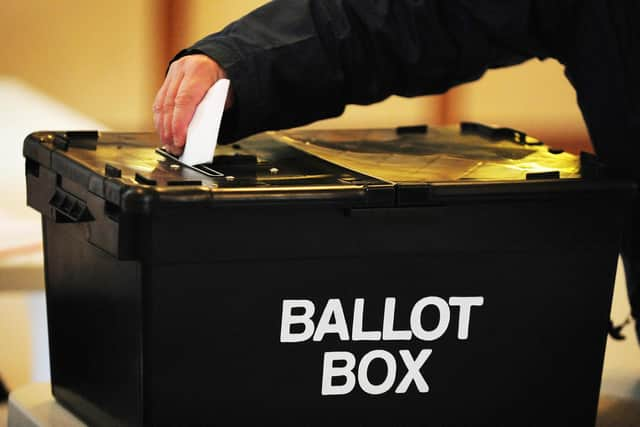Postal voting 'will not benefit' any one party in Scotland
While thousands of Scots have already put in applications for postal votes, ahead of a TV and social media campaign to be launched by the Electoral Commission next week, political scientists do not believe the increase in remote voting will benefit any one party.
In February, 67,000 more people registered for a postal vote, taking the total proportion of Scots registered to 769,329 – 18.38 per cent of the population.


Advertisement
Hide AdAdvertisement
Hide AdIn the US elections last year, Democrats actively encouraged their supporters to vote by post, while Republicans were put off doing so by former US president Donald Trump.
Emily Gray, managing director of polling firm Ipsos Mori Scotland, said: “The context in the US was just so different, you've got very different voting cultures.
"This situation we’re in is a one off and we don't have a precedent, which makes it impossible to predict at this point which parties may be more likely to benefit from postal voting in the Holyrood election.
"Of course, with the elections being conducted during a pandemic, then that means that many more of the public than normal will be unable or unwilling to vote in person, but we don't know who these people are.”
Ms Gray said historically, when postal voting was only for those unable to visit a polling station, Conservatives tended to get a bigger proportion of postal votes. Labour Prime Minister Tony Blair opened up postal voting to everyone in 2001.
Professor Christopher Carman, head of politics and international relations at Glasgow University, said: “We don't have that same level of difference in approach to postal voting across the parties in Scotland. It's not the case that the conservatives are mimicking Donald Trump and calling into question postal voting.
“We're not going to see any particular upswing in people of a certain party who previously maybe weren't voting before.”
Scotland has held eight council by-elections since September last year, with no notable increase in the number of people registered to vote by post. However, that is expected to change in the weeks leading up to the May 6 Holyrood vote.
Advertisement
Hide AdAdvertisement
Hide AdAccording to new figures shown to The Scotsman by the Scottish Government, Orkney has the biggest proportion of postal votes at 29 per cent of the eligible electorate. That is followed by South Ayrshire and East Renfrewshire at 24 per cent.
A poll carried out by Ipsos Mori in November found while 77 per cent of Scots said they would feel safe visiting a polling booth during the pandemic, 38 per cent would prefer to vote by post.
John Curtice, professor of politics at Strathclyde University,
said: “The postal service in the pandemic has not always been reliable, so are voters willing to trust their postal vote? However, the parties are keen on this because it encourages people to go and vote. If you were to double the postal vote as some have predicted, then that could be beneficial for turnout.”
The Scottish Government passed emergency legislation to bring forward the date by which postal vote applications need to be in to April 6.
A message from the Editor:
Thank you for reading this article. We're more reliant on your support than ever as the shift in consumer habits brought about by Coronavirus impacts our advertisers.
If you haven't already, please consider supporting our trusted, fact-checked journalism by taking out a digital subscription.
Comments
Want to join the conversation? Please or to comment on this article.